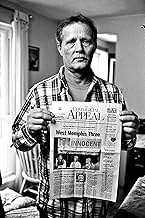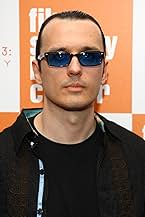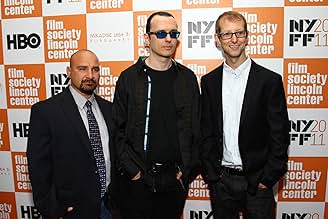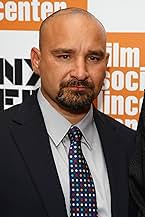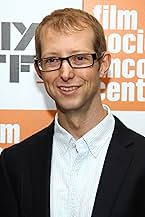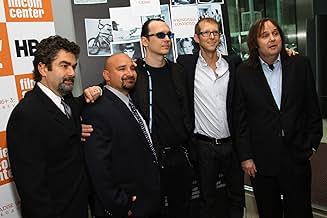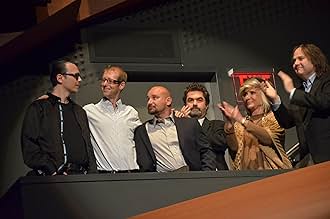Ajouter une intrigue dans votre langueA further followup of the case of the West Memphis Three and the decades long fight to exonerate them that finally gained traction with new DNA evidence.A further followup of the case of the West Memphis Three and the decades long fight to exonerate them that finally gained traction with new DNA evidence.A further followup of the case of the West Memphis Three and the decades long fight to exonerate them that finally gained traction with new DNA evidence.
- Nommé pour 1 oscar
- 5 victoires et 6 nominations au total
- Self - Former Chief Investigator, West Memphis Police
- (archive footage)
- Self - Parent of Michael Moore
- (archive footage)
- Self - Parent of Michael Moore
- (archive footage)
- Self - Mother of Stevie Branch
- (archive footage)
- Self - Mother of Christopher Byers
- (archive footage)
- Self - Perpetrator
- (as Damien Echols)
- Self - Perpetrator
- (as Jessie Misskelley Jr.)
- Self - Prosecuting Attorney
- (as John Fogleman)
- Self - Detective, West Memphis Police
- (archive footage)
- Self - Suspect's Girlfriend
- (archive footage)
- Self - Neighbor
- (archive footage)
- Self - Jason Baldwin's Neighbor
- (archive footage)
Avis en vedette
Part three is mostly set ten to eleven years after the events of the second 'Paradise Lost' movie, and a lot has changed in the years since the new millennium came around and things like new statutes in the state and new evidence peaks its head into existence (and better legal defenses for the three as well). But there are many surprises; the greatest and most unexpected one is a complete 180 from how one saw John Mark Byers. It may speak to the potential for the filmmakers being manipulative, going from positing him as a villain to something of a redeemed person, but it seems a little more complex than that. One may forget watching this film (it isn't mentioned directly) that at the end of part 2 Byers was off to prison.
Maybe that changed him. Or just ten years and that monumental press conference with the host of legal experts - one from the FBI and one involved in the Ted Bundy case - can change a person's mind. But one of the things that's so absorbing this time around is how Byers, previously a Character with a capital C (one may or may not think watching part 2 he'd be capable of the crimes, it's left up in the air almost by how forceful he was in it), uses his knack for being outspoken for the side of the innocent, which he believes now they are (the dead wife is not mentioned, but that's another story altogether).
If there's one small criticism of the film is that there's a lot of footage from the past two films, with the first one shown from the original negatives (hence why they look so scratchy). But I think it's a necessary narrative angle since by this point there may be people coming to this documentary who may have not seen the other films in a while (or, presumably given the nature of channel-flipping TV and ADD) to bring things up and make it a complete narrative. I actually appreciated the use of footage here more than in part 2, and it helped to make a point-counter-point method for the first half of the film; so much time has passed, after all, that the new experts and lawyers and people of that nature could comment on this or that that was presented before, from the alleged occult symbols (basically debunked here as BS) or, most of all, the lack of DNA.
There's so much that comes down in this film that if one comes away at the end and still thinks Echols, Baldwin and Misskelley killed all three of the boys in 1993 then, well, at the least there's little room for any reasonable doubt in your mind based on ALL of the evidence (and as the chapter heading goes here, All is All). But perhaps the thing that will make me revisit this film over time is the fact that the potential - actual - killer comes up as a *different* father, Terry Hobbs, and while on the surface seeming to be less of a Force of Nature like Mark, he's actually an even more fascinating person to just stare at. Which, by the way, you get a lot of time for; via deposition videos, the audience basically gets to see up front what this guy is all about as far as his actual character. I really loved how the filmmakers didn't have to dig too deep to find moments that revealed this person in a whole new light than one saw in part 1; indeed I want to revisit that first part almost immediately to see if any of the signs were there (those little smirks, the bullish expressions) and if they were hard to miss.
Ultimately the West Memphis 3 were freed, but it was based in layman's terms on the justice system saying 'eh, get the hell out of here.' The Alford Plea let the men out, all now in their 30's, but the catch is that they can say they're innocent but plead guilty. One of the things that makes the form of documentary filmmaking so unpredictable and so vital and, in moments like these, so highly charged that it would be difficult to possibly take as a drama, are the turns a story could take. And yet in the Paradise Lost series, all the way through the end of this saga, there's this sense that the entire Justice system, from the police to the prosecutors (probably they come off not quite AS bad as everyone else, but close enough), to the jurors (or that one juror for sure) to the unmovable judge himself, it's all set up to say 'we are right, and you are wrong.'
There are incredible and serious implications and questions that are raised due to what can be read very easily in this story, and a lot of it has to do with class (would these men have been put away if they came from families outside of trailer parks and low-incomes) and status (the 'black-Satan-occult BS). It's a sobering, harrowing, tragic story, and it's all told by these directors with clarity and focus and urgency.
This has an altogether different aim. It presses a case that had by then garnered wide traction, attempts some investigative journalism about who really did it and offers a summation of a fight that was justly won, however late for these people. It was the third film at this point, everyone by now looks more accustomed to the presence of the camera, more self-conscious about us being there to see. It has closure and a moral.
So it doesn't feel like we are catching ignorance unawares and seeing it as it mangles lives. I see instead an article about how terrible it is. I'm glad that it documents what it does of course, dismayed at the redneck judge who is now in the state senate, but that's it.
Excellent use of first person video archives to bring the viewer up to date regarding the crime, it's casualties, and developments. Smashing use of new video interviews, study of involvement and final results of the entire episode surrounding the three accused in this criminal case. The documentary is well put together. Video and sound are excellent.
This is a true historical document that shows a "Crime in America" from start to bitter end. My twenty six year as a law enforcement officer of which twenty were as a death investigator give me a unique opinion of case facts.
It was a genuinely interesting experience for me to look at this documentary from an outside perspective using no real explored physical evidence or deduction.
It intrigued me to follow the case through media coverage, photographic and video graphic statements, as well as personal thoughts, assumptions, and fabrications. This was absolutely what could be expected for the information available to the general public. I have never had to look at information in this manner of privacy and what is available for the average citizen.
This third film picks up with the men having been in prison for 15 years, and finally moving towards possible exoneration under pressure on the Arkansas justice system from across the country and even the world. Mostly the film focuses on the uncovering of yet another possible 'real' killer (although the 2nd film also did so and pointed convincingly at the wrong man, showing just how hard it is to ever fully know the truth). It also shows the lengths to which those involved in the first trial, especially the judge, put their own reputation and their inability to admit error, or even questions, above a search for true justice.
The film has it's flaws; it spends a lot of time re-capping the story, and never seems to acknowledge how confusing the issue of guilt is, as the 2nd film showed in seeming to point at the wrong man for being 'weird', just as the trial did with the 3. Also the dramatic conclusion feels tacked on and incomplete – not the fault of the filmmakers, as much as of timing. The film was essentially done when the directors had to race to Memphis to film a climax that ended up more like an epilogue than it should.
But this is an important document of just how easily the legal system can fail when prejudice and self-interest come into play – as they will continue to do as long as we are human and frail creatures.
The documentary focused on the questionable evidence and lack of thorough police investigative work that lead to their incarceration and hit such chords with the American public that soon celebrities such as Johnny Depp were championing the cause in an attempt to get the three boys a new trial.
Four years later, Berlinger and Sinofsky followed-up their story with Paradise Lost: Revelations which was a more biased account of the teenager's innocence and used new information and footage to help promote their cause.
Fifteen years later, Berlinger and Sinofsky finish the trilogy with Paradise Lost 3: Purgatory that takes one final look at the teenagers that have grown into 30-year-old adults in prison for a crime that lacked the forensic evidence to convict if put on trial today.
Paradise Lost 3 opens in 1994 and we get the hard-to-watch actual crime scene footage of the three naked 8-year-old boys who were left hogtied with shoelaces in a small wooded area known as Robin Hood Hills.
With pressure from the media and the increasing tension amongst residents of the town, authorities soon charged teenagers Jason Baldwin, Jessie Miskelly and Damien Echols with murder and sentenced two of them (Baldwin, Miskelly) to life in prison without parole and Echols with the death penalty. The case was built upon their association with each other and loose allegations that the three were part of a satanic cult thanks to their preferred dark clothing and various graffiti and doodles of skeletons that were part of the group dynamic.
Although not as engrossing as 1996's Paradise Lost, Purgatory again presents its case of innocence by interviewing or taping experts in their fields discuss the case and with a 2007 re-examining of the evidence by authoritative members of their fields (DNA, forensics etc). Scattered interviews from 1994 through 2010 help assert that justice may not have been done and that stubborn individuals who had involvement in the case provided the judicial roadblocks to impede any progress.
Paradise Lost 3 spends a bit more time in an assumption of another potential murderer of the three boys and they are fueled by celebrities Johnny Depp, Eddie Vedder and even a member of the Dixie Chicks in their attempts to have new evidence presented and justice served.
Paradise Lost 3 wrapped filming in August 2011 – three days later, the Memphis 3 were released from prison on a lesser charge that does not clear their innocence. Berlinger and Sinofsky informed the sold out crowd at the Toronto International Film Festival that we will be the first and the last to see this theatrical version as a new ending has since transpired (which drew a loud applause from the agreeing audience).
One of the real tragedies of the now trilogy of Paradise Lost films is watching three teenage boys age while in prison. They have missed out on an entire life's worth of experiences (one did get married while incarcerated to a female fan) and we can only hope that a follow-up film 10 years from now shows us how the three were able to assimilate back into society and become everything that they should and could have been had they not been wrongly accused.
www.killerreviews.com
Le saviez-vous
- AnecdotesTodd and Dana Moore, the parents of 8 year-old victim Michael, wrote a letter to the Academy of Motion Pictures Arts and Sciences asking that the film be removed from consideration. In the letter they said that the film glorifies Damien Wayne Echols, Jason Baldwin and Jessie Misskelley. Director Joe Berlinger had in fact acknowledged during an interview with salon.com that he determined Echols was innocent after speaking with him for five minutes prior to the trial. Despite the Moore's request the film was nominated for Best Documentary, Features for the 84th Annual Academy Awards. It lost to Undefeated (2011).
- GaffesMichael's dad says he hopes the West Memphis Three are burned at the stake, like in Salem. He is referring to the Salem witch trials, in which none of the convicted were executed that way. They were hanged. This is a popular misconception, that confuses colonial times with the medieval.
- Citations
Damien Wayne Echols: If I focused on the things I can't change, the things that have hurt me, what people have done to me, then they would have already broken me. They would have killed me inside and out. I can get up in the morning and I don't feel sorry for myself, I don't hate my life. You have a lot of people in here that all they can think about is what they don't have and how much they want out and how much they want something else. But for some reason, this situation has helped me to see more of what I do have and to be thankful for that. You know, I have, in a lot of ways, I have a truly incredible life.
- Autres versionsThe directors said that audiences at the Toronto International Film Festival in September 2011 would be the only audiences to see the film in that version. The reason is that events which took place the previous month necessitated a new ending to the film.
- ConnexionsFeatured in West of Memphis (2012)
- Bandes originalesWelcome Home (Sanitarium)
Performed by Metallica
Written by James Hetfield, Lars Ulrich and Kirk Hammett
Published by Creeping Death Music (ASCAP)
Courtesy of Elektra Entertainment Corp
By arrangement with Warner Music Group Film & TV Licensing
Meilleurs choix
- How long is Paradise Lost 3: Purgatory?Propulsé par Alexa
Détails
- Durée2 heures 1 minute
- Couleur
- Rapport de forme
- 1.78 : 1



